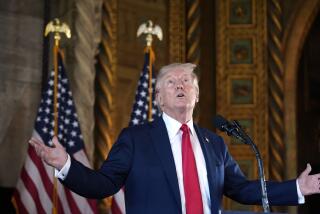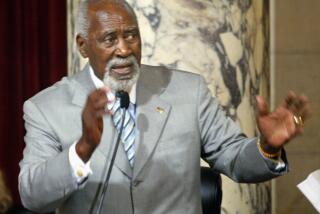Commerce Secretary Hoped to Sell Peace During Bosnia Venture
- Share via
WASHINGTON — On his trade mission to Bosnia, Commerce Secretary Ronald H. Brown was seeking a bounty far more elusive than rich contracts for U.S. companies, the usual aim of such overseas ventures.
This time, a primary goal was to promote peace--through a massive rebuilding effort in the war-torn region.
The U.S. entourage whose jetliner crashed Wednesday represented a wealth of American know-how in building bridges, fixing roads, making water safe to drink, recovering farmland and a host of other skills needed to restore normal life to Bosnia and Croatia.
“We know the task is ominous,” Brown said Tuesday of the vast, $5.1-billion reconstruction job spearheaded by the World Bank. He added: “Peace and stability will only be ensured through economic development.”
Brown’s trip, which included the most significant U.S. corporate delegation to visit the region since the formal end of hostilities in December, was intended as a preliminary step in the larger, international effort to rebuild Bosnia and Croatia. The Clinton administration has called for $600 million in U.S. aid over the next few years, and the World Bank approved more than $260 million in transportation, water and energy projects last week alone.
As Brown was certainly aware, the trade mission represented an unusual overlap of business opportunity and diplomatic need.
U.S. executives were in position to capture lucrative work for their companies, paid for with hard currency from wealthy nations. At the same time, they would be providing desperately needed improvements that could add stability to a traumatized society in Central Europe. It is a formula being attempted in the Middle East, Northern Ireland and South Africa, where peace advocates also seek economic development as a way to transform the psychology of hostile peoples.
The reasoning goes something like this: Those who believe in a more prosperous future are less likely to make war than those who do not.
“These projects and missions are meant in part to provide evidence to the people of Bosnia-Herzegovina that the peace process is taking hold, that reconstruction is underway and [that] they will see a visible peace dividend,” explained David M. Theis, a World Bank spokesman.
Reconstruction specialists are seeking such a dividend for Bosnia by promoting a long list of “urgent” projects in the region, ranging from fixing power plants and telephone lines to purchasing livestock and improving veterinary services.
A key goal of Brown’s trip was to give U.S. executives a chance to become familiar with the plethora of needs in the region so that they might consider bidding on jobs for their companies. Thus, firms with experience fighting fires in Kuwait or monitoring U.N. police efforts in Haiti were invited to participate.
The companies included such giant engineering and construction firms as Bechtel Corp. and Parsons Corp., AT&T; Submarine Systems and Riggs International Banking Corp. of Washington.
“I think Ron Brown’s intent was to let business people see what was there--and maybe they would come up with ideas once they saw what was needed,” said Janine Carey, spokeswoman for DynCorp Inc., a provider of communications and other services in Reston, Va. “As they [Bosnians] start to rebuild their road system, their communications systems, their infrastructure, there might be opportunities.”
In a twist of fate, DynCorp’s chief executive, Daniel R. Bannister, bowed out of the trip at the last minute.
Brown led the first high-level American business delegation to travel to Bosnia since the Dayton accords, signed in December, ended nearly four years of war last fall. In addition to meetings with an array of business and political leaders, the U.S. group had scheduled a “town hall” get-together with college students to discuss the rebuilding effort.
“The mission generated a lot of excitement here for that reason,” said Fletcher Burton, deputy chief of mission at the U.S. Embassy in Sarajevo, noting the previous absence of visitors from corporate America.
In one sense, the Bosnia trip was a routine mission for Brown, who logged tens of thousands of miles--typically with a coterie of chief executives in tow--promoting U.S. business and exports throughout the Western Hemisphere, Asia and Africa. Although such efforts drew critical personal scrutiny, including investigations of his financial affairs and charges of cronyism, they were applauded by many who viewed Brown as an unusually effective advocate for their interests.
At the end of the 1994 mission to Beijing, for instance, he announced that U.S. firms had snagged about $6 billion in 10 days. U.S. firms won juicy contracts in Saudi Arabia and many other countries with Brown’s helpful advocacy.
“He’s done more than any previous administration in promoting American exports,” Calmen Coeh, the head of the largest group of U.S. exporters, declared at the time of the 1994 visit to China.
But the extraordinary stakes made the Bosnia visit anything but routine, and many expressed fears on Wednesday that the process of reconstruction might be another victim of the crash.
A reason is that the tragedy occurred at a delicate, early moment in the money-raising effort and could spook those who already had doubts about whether Bosnia is worth the time and money required. Given a global choice of investment opportunities, why would a profit-driven firm take risks in so perilous a locale?
“It might have a psychological impact, and people might say, ‘This was because of Bosnia,’ but it [the crash] could have happened anywhere in the world,” said Eric De Troyer, a Belgian sales representative for the American firm Guardian Glass.
The fact that Western nations are committing themselves to a growing financial stake in Bosnian redevelopment is perhaps the key reason that companies would take their chances. Last week, for example, Congress approved $198 million in assistance, about a third of the $600 million the White House had requested.
A key step in that international commitment is scheduled for later this month, when representatives of donor nations are set to meet in Brussels. Brown had envisioned building on such meetings with a conference this fall of experts from the seven advanced industrial powers, along with representatives of Central European nations.
The nexus--among trade, business, diplomacy and peace--is one in which he seemed entirely at home.
Times staff writer Tracy Wilkinson in Sarajevo contributed to this story.
(BEGIN TEXT OF INFOBOX / INFOGRAPHIC)
A Man With a Mission
The Commerce secretary traveled the world over promotion U.S. trade. His itinerary included:
October 16, 1995
Beijing, China--On three-day visit to Beijing, China, Brown says the United States and China have have made progress in negotiating about $20 billion worth of new U.S. contracts involving energy, aviation and telecommunication projects. Meets with Chinese President Jiang Zemin.
Jan 18, 1995
New Delhi, India--Brown announces 10 new deals for American companies estimated at a $4 billion Industries represented include power, telecommunications, petrochemical and medical services contracts. He also meets with Indian Prime Minister P.V. Narasimha Rao. More than two dozen executives accompay Brown. “It’s like a summit meeting--it speeds things along,” says Daniel P. Burnham, president of AlliedSignal Aerospace, who concludes a $150-million contract to provide helicopter engines to an Indian manufacturer.
Aug 27, 1994
Beijing, China--Brown, accompanied by 24 American executives-- nine from California--pays an eight-day visit to China. The mission is hailed by its hosts as an economic fresh start after President Clinton’s decision not to link trade ties and human rights. The mission is aimed at producing billions of dollars in new contracts for U.S. businesses. The trade mission also stops in Shanghai, Guangzhou and Hong Kong.
June 26, 1994
SOUTH AMERICA--Brown, accompanied by a 22-member delegation of U.S. corporate leaders, visits Brazil, Argentina and Chile on a trade mission aimed at bringing American and Brazilian business people together to increase trade. Delegation members included the heads of such Fortune 500 companies as MCI, Hughes Aircraft, Unisys Corp. and Comstat. Brown meet with Argentine President Carlos. Brown said the trip reflects the U.S. commitment to increased trade between the United States and Latin America, currently America’s ‘fastest-growing export market’ for the U.S.
March 29, 1994
RUSSIA--Brown and 28 leading American business executives win a commitment from the Russian government to review a controversial $5-a-barrel export tax on oil. On a weeklong trade mission Brown meets with Russian Prime Minister Viktor S. Chernomyrdin to discuss taxes and tariffs. The delegation succeeds in clinching the sale of four Boeing aircraft that had been held up because of a 50% import tariff.
Nov 29. 1993
SOUTH AFRICA--Brown and 25 business leaders arrive in Johannsburg for a three-day trade mission. It is the first mission since President Clinton lifted the South African embargo. Of the mission, Brown said: “Economic growth is the single most effective path to political stability.”
Compiled by D’JAMILA SALEM / Los Angeles Times
(BEGIN TEXT OF INFOBOX / INFOGRAPHIC)
Profile: Ronald H. Brown
Wednesday’s ill-fated flight to Croatia was another in a series of trips the Commerce secretary had led of high-profile delegations of U.S. business executives. Other destinations had included China and India. Here is a look at Brown’s life and career:
* Born: Aug. 1, 1941, in Washington, D.C. Raised in Harlem, N.Y.
* Education: Bachelor of arts from Middlebury College in Vermont, 1962; law degree from St. John’s University in New York City, 1970.
* Career highlights: Past chairman of the Democratic National Committee, the first African American to lead either major U.S. political party; former partner in the Washington law firm of Patton, Boggs & Blow; onetime chief counsel for the Senate Judiciary Committee; spent 12 years with the national Urban League as deputy executive director, general counsel and vice president for its Washington operations.
* Family: Married, two children.
* Quote: On Republican efforts to dismantle the Department of Commerce: “I take the threat seriously. It would be tantamount to unilateral disarmament in the battle for global competitiveness.”
More to Read
Inside the business of entertainment
The Wide Shot brings you news, analysis and insights on everything from streaming wars to production — and what it all means for the future.
You may occasionally receive promotional content from the Los Angeles Times.










